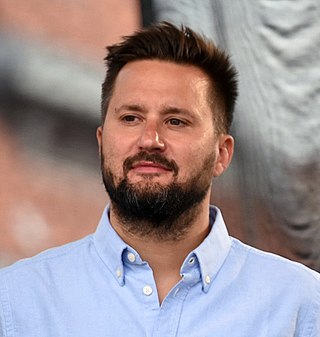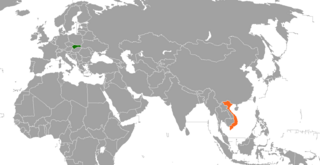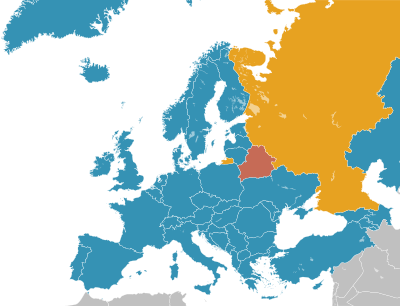
Petržalka is the largest borough of Bratislava, the capital of Slovakia. Situated on the right bank of the river Danube, the area shares a land border with Austria, and is home to around 100,000 people.

Rimavská Sobota is a town in southern Slovakia, in the Banská Bystrica Region, on the Rimava river. It has approximately 24,000 inhabitants. The town is a historical capital of Gömör és Kishont County.

ŠK Slovan Bratislava is a professional football club based in Bratislava, Slovakia, that plays in the Slovak Super Liga. Founded as I. ČSŠK Bratislava in 1919, the club changed its name to Slovan Bratislava in 1953. Slovan is the most successful team in Slovakia with the most titles in both league and cup in the country.

Lesbian, gay, bisexual, and transgender (LGBT) people in Slovakia face significant challenges not experienced by non-LGBTQ residents. The status of LGBT rights in Slovakia are regarded as some of the worst among the European Union countries.

Všešportový areál was a multi-purpose stadium in Košice, Slovakia. In its 21 years operating as a professional football ground, the Czechoslovakia national football team, then the independent Slovakia national football team, and local club FC VSS Košice played home matches there from 1976 to 1997.

Capital punishment is forbidden by the Charter of Fundamental Rights and Freedoms of the Czech Republic and is simultaneously prohibited by international legal obligations arising from the Czech Republic's membership in both the Council of Europe and the European Union.

Ján Slota is the co-founder and former president of the Slovak National Party, an extremist nationalist party. Slota as the leader of SNS entered into a coalition with Robert Fico's Smer in 2006. He was the mayor of the city of Žilina from 1990 to 2006.
Capital punishment is a long unused form of punishment in Brazil. The last recorded instance of a death penalty convict being executed in the country was in 1876. Although virtually abolished, it is still legal during wartime, according to the Article 5, XLVII, "a", of the Federal Constitution. Brazil is the most populous country in the world that does not retain the death penalty in practice. It is also one of seven countries to have abolished capital punishment for ordinary crimes only.

Pavol Paška was a Slovak politician who served as Speaker of the National Council of the Slovak Republic from 2006 to 2010 and again from 2012 to 2014. He was a member of the Direction – Social Democracy (Smer-SD) party.
Slovakia does not recognise same-sex marriage or civil unions. However, there is some limited legal recognition for unregistered cohabiting same-sex couples, notably with regard to inheritance rights. The Constitution of Slovakia has limited marriage to opposite-sex couples since 2014, and bills to allow same-sex civil partnerships have been introduced several times, most recently in 2023, but all have been rejected.
Life imprisonment in Slovakia is a sentence of indeterminate length, lasting until the convict's death. In Slovak law, since the abolishment of the death penalty in 1990, it is the most severe punishment available. After 25 years, the prisoner can apply to the prosecutor to be released on probation. At any length of time, the prisoner may apply to President of Slovakia for clemency.

Andrej Kiska is a Slovak politician, entrepreneur, writer and philanthropist who served as the fourth president of Slovakia from 2014 to 2019. He ran as an independent candidate in the 2014 presidential election in which he was elected to the presidency in the second round of voting over Prime Minister Robert Fico. Kiska declined to run for a second term in 2019. He has written two books about happiness, success, and his life.

Presidential elections were held in Slovakia in March 2019. Incumbent President Andrej Kiska did not run for a second term.

Matúš Vallo is a Slovak politician, architect, urban activist, musician, and the current Mayor of Bratislava. He was elected in 2018 with 36.5% of the vote as an independent politician, and re-elected in 2022 with 60.2% of the vote backed by his own local party Team Bratislava as well as Sloboda a Solidarita and Progresívne Slovensko.

Slovakia–Vietnam relations refers to the bilateral relations between Slovakia and Vietnam. Slovakia has an embassy in Hanoi with a consulate in Ho Chi Minh City; and Vietnam has an embassy in Bratislava.
Marek Mach is a Slovak activist, entrepreneur, co-founder and chairman of civic association Mladí—an organization known for founding the Youth Against Fascism initiative.

On 12 October 2022, two people were killed, and a third person was wounded in a shooting outside of the front entrance of Tepláreň, a gay bar in Bratislava, Slovakia, a well-known spot frequented by the local LGBTQ community. The shooting claimed two victims: Juraj Vankulič, a non-binary person, and Matúš Horváth, a bisexual man. The perpetrator was found dead from a self-inflicted gunshot the morning after the attack.
Dobroslav Trnka was a Slovak lawyer who served as the prosecutor general of Slovakia from 2004 to 2011. On 25 February 2021, he was banned from entering the United States by the U.S Secretary of State Antony Blinken due to his involvement in significant corruption.














